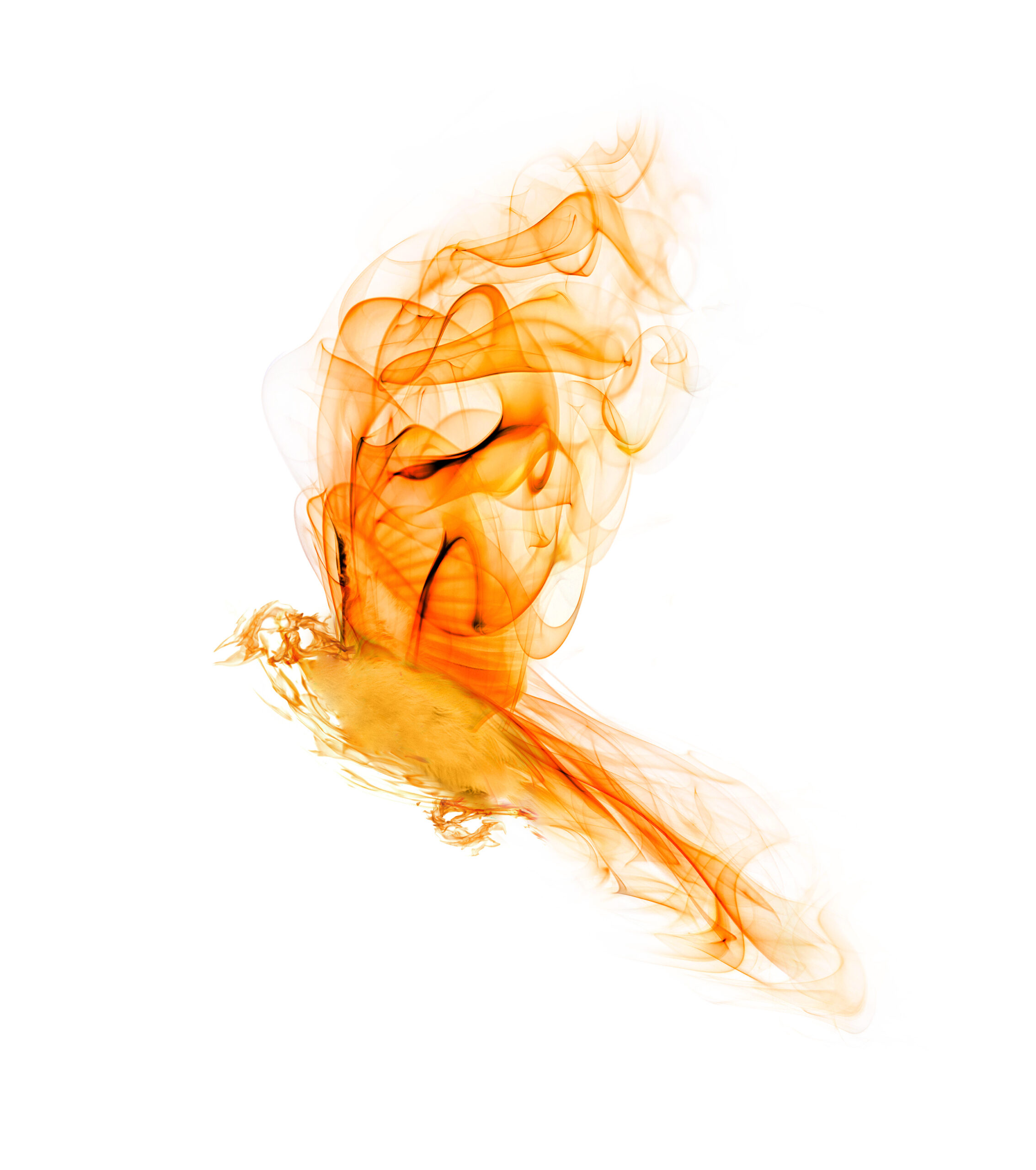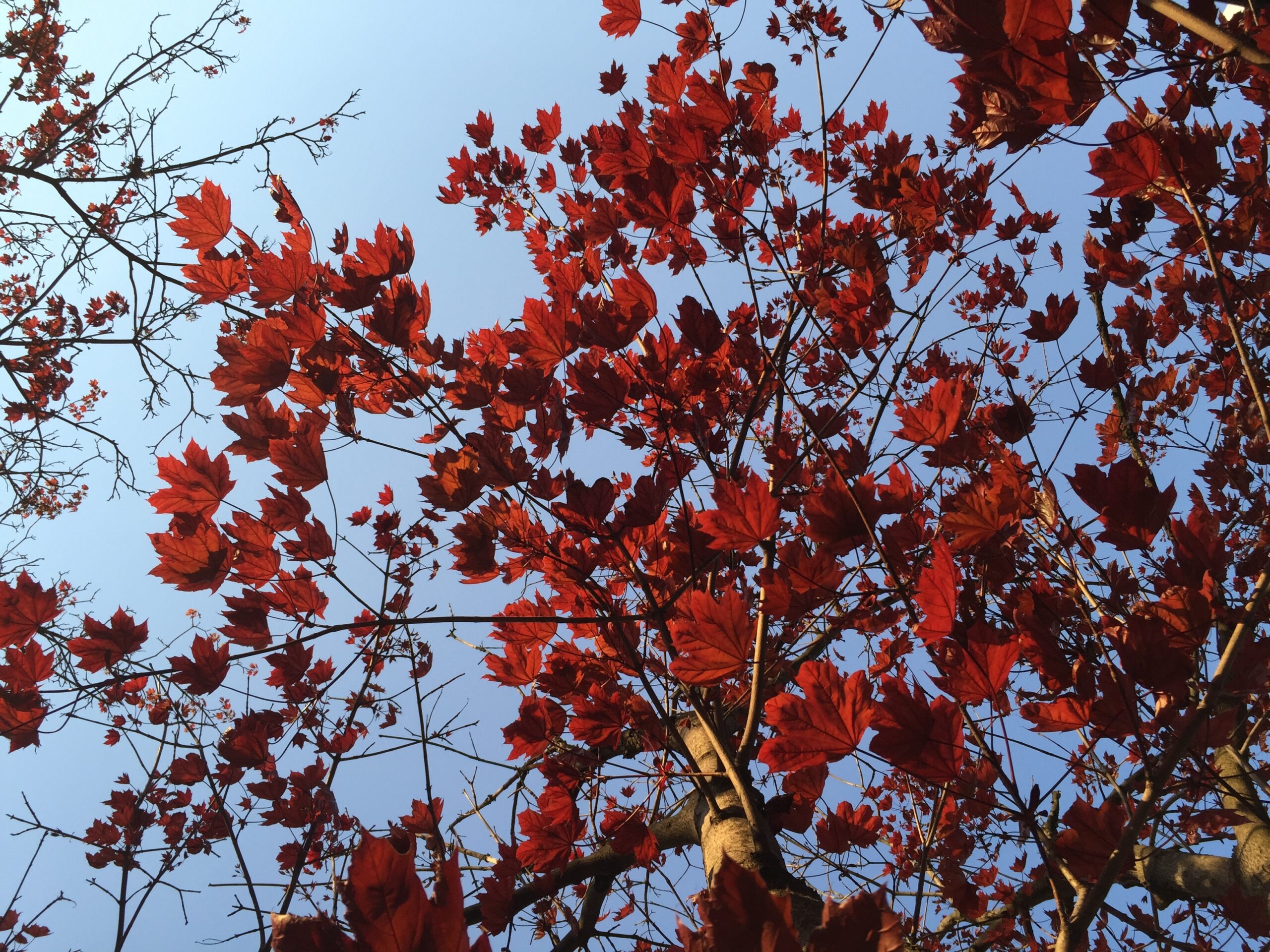To speak everything is to exhaust mystery.
—Joy Harjo
Brainstorming
In collaborative writing, no one person owns the text. All do. This runs counter—subversively so—to how most writing, with an individual at its center, functions in our culture. When kids write collaboratively, all student voices come into play and influence each other. The results can be spontaneous, inspired, funny, profound—even mysterious.
The collaborative poem, “The Mysterious Bird of Fire,” written by a class of 17 fourth graders in a rural Maine elementary school, emerged from the first writing assignment I gave them during a two-week visiting writer residency.
To warm things up, I turned to an ancient, but still relevant, teaching strategy. I asked a question:
“What’s a poem, a really good poem, about?”
OK, maybe not so easy to answer. It would have at least as many answers as there were students. I waited, to give them a chance to think about something I assumed they hadn’t been asked before.
When kids write collaboratively, all student voices come into play and influence each other.
I resisted a quick, nervous follow-up: I did not “help” them by answering the question myself. There was nothing next to rush to. After half-a-minute, a girl’s hand shot up from the front row. “Happiness,” she suggested, which was quickly followed by, “Being sad,” from another girl, speaking as if she had just righted an imbalance in the universe.
“Those are good topics for poems,” I agreed. “Poems express feelings, such as happiness and sadness. They are also populated by things, people, and other life forms, real or imaginary. What’s an example of something or someone that would fit in a poem?”
A boy in the back shouted out, “Food!” Yes, I thought, when everyone laughed. Humor is a terrific lubricant for creativity.
A minute or so of brainstorming followed—rats (“ew, gross”), daisies (“not flowers again!”), aliens (“not aliens again?!”); then, someone suggested, “a bird,” and a murmur of assent, whether from brainstorming overload or true interest, filled the room.
“Be more specific about this bird,” I insisted.
“A big one,” said a boy.
“A fast one,” said another. Some nodded heads. Out of the blue, the boy in the back let loose with, “A bird of fire!” Wow. That got the room spinning.
“A bird of fire,” I repeated. “Is it an eagle? Robin? Sparrow?” None of the birds they knew were fiery enough for them. A defeated silence descended and lingered until a girl in the third row whispered, “The mysterious bird of fire.”
Glee erupted all over the room.
Accessing Mind’s Eye
It’s fascinating what happens when you invite students to deliberately pay attention to the mind’s eye.
“Let’s write!” I proclaimed. “Make a poem about your experiences with this bird, true or made up. When you’re done, I’ll merge them into a big poem. All of you will have a chance to read your part out loud in class tomorrow.”
Assent produced a rustling in seats. No questions for now; objections, if any, muted. Overall, an eagerness to get on with it.
I turned off the lights. Without overhead fluorescents, the room lost its hard, institutional corners and edges, becoming a pod, with us, its seeds, glowing in the pastel semi-dark.
“Close your eyes. Imagine you and the mysterious bird of fire are on an adventure. Believe what’s happening in your mind’s eye—what you perceive when your eyes are closed—is real.”
I set a timer for three minutes, long for a fourth grader to sit still, but each did so silently, some with heads lowered on desks. It’s fascinating what happens when you invite students to deliberately pay attention to the mind’s eye. I find it allows for unexpected insight, information, and imagery to germinate, pushing up and out, ripening.
In-Class Writing
I cherished the quiet, listening as pencils and erasers moved with intention, punctuating the air with muted sounds, exposing rhythms in languages of their own.
“Open your eyes.” Three minutes were up. “For the next 15 minutes,” I said, “write what you remember about your adventures with the bird.”
Still returning from their daydreaming state, the students barely moved. A few to the side had begun talking about Santa Claus and crayons. It was early December.
“Take your paper and pencil and begin writing what you saw and heard and smelled, maybe even touched or tasted, on your adventure. Do this silently, so that all your memories go onto the page and don’t vanish into the air with chitter-chatter.”
I kept the lights off. A north light—plenty for the students to see and write by—filtered through windows that looked out to the road where one, maybe two, cars passed by each minute.
The students settled in. They were lethargic at first, then tentatively focused. A minute into it, all were writing determinedly. I cherished the quiet, listening as pencils and erasers moved with intention, punctuating the air with muted sounds, exposing rhythms in languages of their own.
When the 15 minutes were up, I showed them how to end stop lines of their poems. We read and discussed Edward Field’s translation from the Netsilik, “Magic Words,” as an example. It beckons to something deep-seated and ancient about humans’ use of words that most children know intuitively. “In the very earliest time, / . . . All spoke the same language. / That was the time when words were like magic. . . .”
I then asked the students to go on a scavenger hunt for punctuation marks in their writing and rearrange their lines to be end-stopped. I checked in with each student about their understanding of end-stopping, which they easily mastered. I found Field’s poem had given some of them license to edit their poems to be even more magical.
Editing Student Writing for Publication
I had given them license to play with their imaginations and they had responded, not to please me but themselves.
I read through the poems at home that evening and loved them. Each student had articulated an experience that was particular to themselves. I had given them license to play with their imaginations and they had responded, not to please me but themselves.
Shuffling through the poems, I looked for a guiding theme I might use to pull them together into a single entity. I couldn’t find a unifying storyline, so I decided to honor the multiple narratives, piecing together a sequence. As I read the students’ words out loud to myself, I heard their multiple voices as a choir in which individuality was both preserved and a contributor to a greater whole. I inserted each of their names, indicating who was to speak, at the beginning of their lines.
The students had no idea when they woke up that morning they’d be creating a collaborative poem. Creative writing class is full of surprises. There would have been no way to script all of it beforehand.
Performing the Poem
En masse, they embodied the emotions of each individual voice, elevating them into a chorus.
In the morning, at the beginning of class, I gave each student stapled sheets of paper—their collaborative poem. It was the first time any of them had seen their writing printed in a booklet. Their words and their names. The room was abuzz.
Their enthusiasm carried the day. They practiced their lines with each other and me. Fun and learning were inextricably joined. I urged them to read each word with feeling. After about 40 minutes, they were ready for a performance, if only for themselves. Authors and audience were the same.
No one had to be coaxed to read. Some read more from the heart or more fluently than others, but that didn’t matter: each voice was heard. En masse, they embodied the emotions of each individual voice, elevating them into a chorus. When it was over, they performed the poem a second and then a third time together because that’s what they wanted to do. They relished every moment.
As the class was ending, I said to them: “You accepted the bird for what it is. You did not stamp out its mysteriousness by trying to explain too much. The bird is alive on the page and in the air and in your voices. You felt it, you still feel it, so it is real.”
The Finished Poem
The Mysterious Bird of Fire
Karl:
I felt a shiver of coldness blow past me.
Suddenly, a bird of fire swooped past
And made me warm.
It perched on my shoulder
And sang a beautiful song.
Then it flew away.
Where it had perched was a steamy hole on my shoulder.
I looked in and saw some flames still burning.
I put my hand in and grabbed the flames.
My eyes felt like hot coals.
I blinked them twice and wondered,
Where did that bird fly away to?Eleanor:
My muscles are sore.
I shouldn’t have pretended that I was the bird of fire yesterday.
I can barely walk.
All I can do is lie here like a weed.
Hopefully in a month or so I can walk.
Probably in a week I can sit up.
Ouch! I moved my finger.
One day soon I hope to fly again.
Eva:
Things are different ever since the bird of fire flew into town.
My hand wanted to collapse and it did!
I showed Mr. Travers.
Then everybody’s hand fell off.
We had to go home because we couldn’t write.
Mr. Clark’s hand fell off while driving the bus.
We almost crashed.
When I got home my cat’s paw fell off.
I thought good!
Now it can’t bat the dog!When I got inside Mom’s hand came off.
My dog’s paw came off.
When I showed mom my hand,
My dog jumped up to get it and ate it.
Then one of his ears fell off.
My ears fell off.
Everybody’s ears fell off.
Mom’s eyeballs fell off.
So did mine.
Everybody’s ears fell off!Nathan:
Things are getting weird.
Santa came down the chimney,
and he had a purple suit on,
and his hair was dyed orange and pink,
and he had a Mohawk.
He looked at me and said:
Who are you?
I said:
I don’t know.
He put presents down
and went back up the chimney.
I opened up the first present
and inside was the bird of fire.Forrest:
The fire engine raced down the street.
And the hook and ladder and the rescue truck
attached the hoses to the fire hydrants.
The truck put the water up into the air.
It put out the match on top of the building.
The match was a bird of fire.Demitri:
I took that match to California.
It became a mysterious, tall, black-haired man
driving a Corvette.
He saw a Ninja Turtle pop up from the sewer
who said: “Awesome car, dude.”
But the dude didn’t hear him.
He was too busy running after another guy
all dressed in blue and pink.
Then a bird charged up to him breathing fire.
His eyes were yellow
and looked like flames inside of them.
The flames grew smaller and smaller and smaller.
Night turned into day,
and the black bird turned into a little elf.Renaldo:
The toes of the elf were slime.
His hair on his arm felt like porcupine quills.
His chest felt like a drum when I beat on it.
His stomach felt like a bowl of Jell-O.
His eye felt like a stone with snot on it.Jackson:
One day I was walking through the woods
when I saw a castle.
For a minute I thought I was dreaming.
But it was true.
The castle was made out of stones
that used to be the eyes of elves.
A man came from the castle
and he gave me a bird
with yellow eyes
and said: “Get on, let’s go.”
And I said: “Why?”
And he said: “Some other people are attacking the castle,
that’s why.”Doug:
I was that man riding away from the castle.
I had a gun.
I looked through the scope.
I pulled the trigger
and an eyeball came out of the barrel.
The eyeball landed on top of the Empire State Building,
then it jumped off
and landed on a bicycle with no seat,
slid down a razor blade,
and landed in a bottle of iodine.
The eye was stuck in there.Nevaeh:
I was sitting on a candle when the eyeball saw me.
The candle said: “Please get off my back.”
So I got off.
He told me to put him out, so I did.
It was dark.
The eyeball told me to light the candle back up again.
He told me to take him out of the bottle of iodine,
so I did.
When I did, someone screamed.
The eyeball and I ran into the living room.
My mom had a lobster on her nose.
The eyeball yanked it off.
We all screamed next because a giant scorpion came in.
The eyeball got a fork and a bow
and shot the fork at the scorpion.
It hit the scorpion, and then it evaporated.
Everything was OK for a minute.
Then the eyeball turned into a bird of fire and said:
“I’ll give you a ride out of here.”Alice:
I looked up at the sun and said:
“What is going on in my mind?”
Then I said to myself: “It’s me. It’s me.”
And I started to fly, and I said:
“Oh, baby, am I flying!”
Then Nicole and the bird of fire picked me up
and said: “Hold on tight.”
We went past the sun.
I went to hold onto the sun,
and the sun said: “Hold on tight.”
I said: “OK. I will hang on”
We started to fly down.
I got off.
I ran to my friends.
They said: “Thank God.”Jane:
If my crayon were Santa Claus,
I would need to feed him so he would get fat.
But the bird of fire might get mad
that I was feeding the crayon instead of him.
The crayon yelled out: “I want watermelon and a banana.”
But the bird of fire won’t stop whining about food.
I think the bird of fire is fat enough.Alexa:
The bird of fire came out of the sky.
I like the bird of fire.
Do you like the bird of fire?
The bird of fire is pretty.
I want to rip the bird of fire out of the sky.
I want to wear the bird of fire
like a pin on my dress.John:
There is a boy.
He is doing nothing.
The sun is beating down on him.
It starts to rain.
The rain has hail in it.
The boy’s name is No One.
His mom comes out to get him for supper.
All they have to eat is one pea.
The boy says, “I want more to eat.”
So he goes out to find more food.
He comes to Maine.
He steals food.
The police find him.
They try to find his Mom,
but she lives in Florida.
They put him in a foster home.
He has grandparents that live in Maine,
so they take him in.
They bring him food.
He eats so much he turns into a bird of fire.Delores:
This is what the bird of fire told me
Before his grandparents found him and fed him:
“My feet are wet.
My fingers are melting.
My knees are shrinking.
My vest is gone.
My wing is falling off.
I am shrinking.
I am almost gone.
I will never see my parents again.”Daniel:
And this is what the bird of fire told me
before his grandparents found him and fed him:
“My eyes feel like they are boring
because my eyes can’t read.
My body feels kind of tingly and funny.
And my feet feel as if I get gas in them
because they sweat a lot when I am hungry.”Suzie:
I am also hungry.
I wish I was home.
Last time I was there my mom called me for supper.
Ahhh!!!!!
But her face was falling off.
Oh, no!!!!!
Dad’s too!!!
“What’s for supper,” I asked.
“Boiled bird of fire,” my mother said.
“Ahhhhh!!!!!!!
Not my friend, the bird of fire!!!!!”
I ran out of the house.
I couldn’t eat.
I am still hungry!

Mark Melnicove
This essay is a chapter from Mark Melnicove’s manuscript-in-progress about his experiences teaching collaborative creative writing in schools. A recipient of PEN’s New England Discovery Award and a Maine Arts Commission Fellowship, Melnicove has been a writer-in-residence for over 40 years, grades Pre-K-12, and in 2021 retired as a high school ELA classroom teacher. His books include Sometimes Times (Dome Editions, 2023; Two Palms, 2017), Africa Is Not a Country (Lerner Publishing Group, 2022 and 2001, winner of the Children’s Africana Book Award), and Ghosts (Cedar Grove House, 2019). He's also edited, with Fredrik Averin, a new collection of Bern Porter's found poems, Now It Can Be—Why Did It Fail Before? (The Idea of The Book, 2023). He received his MFA in writing and literature from Bennington College in 2000. Bowdoin College’s George J. Mitchell Department of Special Collections & Archives houses a collection of his papers. He lives in the Kennebec River Valley, in Dresden, Maine.



